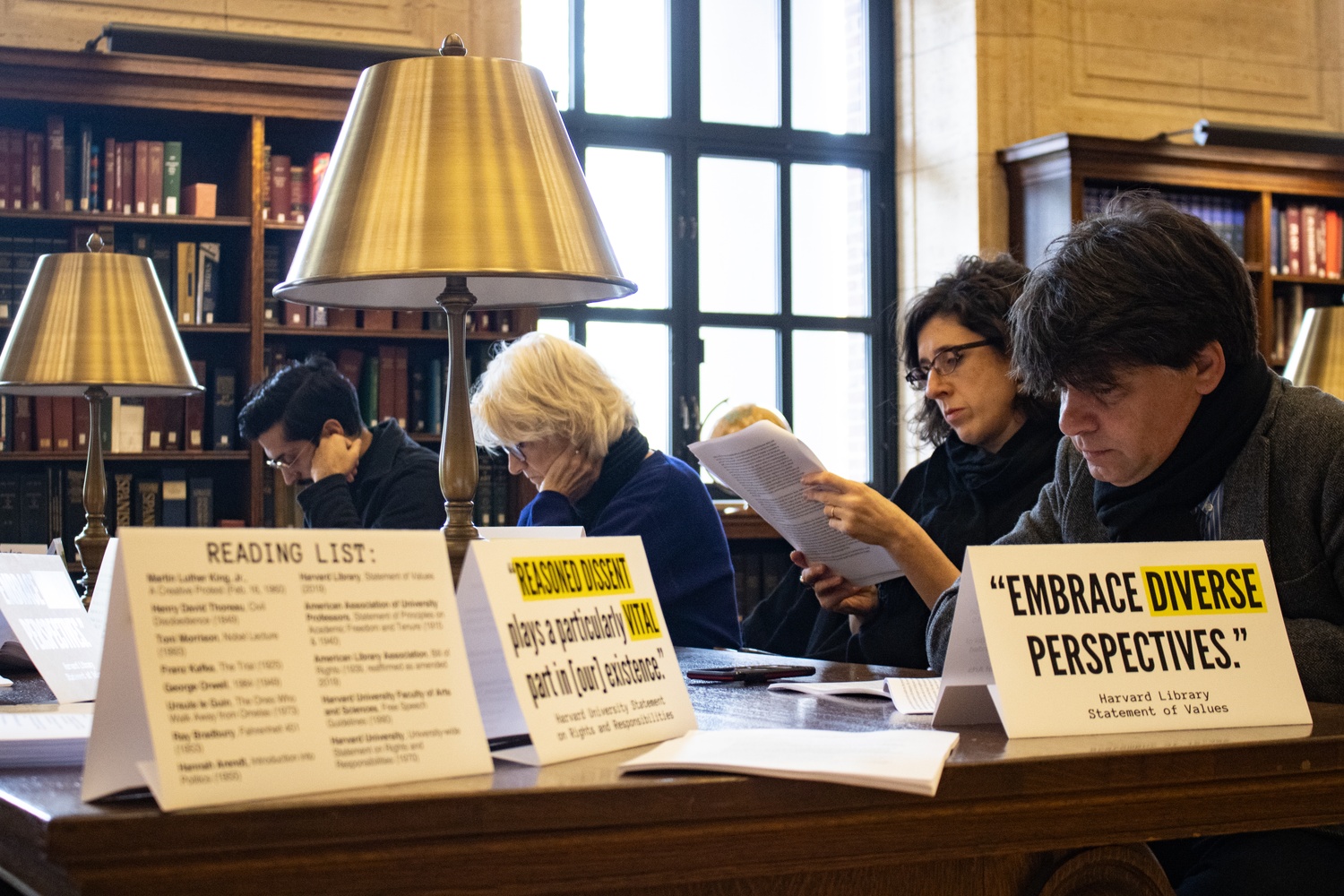
News
Nearly 200 Harvard Affiliates Rally on Widener Steps To Protest Arrest of Columbia Student

News
CPS Will Increase Staffing At Schools Receiving Kennedy-Longfellow Students

News
‘Feels Like Christmas’: Freshmen Revel in Annual Housing Day Festivities

News
Susan Wolf Delivers 2025 Mala Soloman Kamm Lecture in Ethics

News
Harvard Law School Students Pass Referendum Urging University To Divest From Israel
Harvard Faculty Appeal Temporary Suspensions From Widener Library

Faculty members who were temporarily banned from Widener Library for participating in a study-in protest appealed their sanctions to Harvard Library, calling their suspensions “unlawful violations” of their contracts.
In a Monday email to Martha J. Whitehead, who heads Harvard Library, 18 of the roughly 25 suspended faculty members called the library suspensions “inconsistent” with Harvard’s rules and disputed that they had even “engaged in a ‘demonstration’ or ‘protest’” in the first place.
The faculty were suspended for two weeks beginning Oct. 25, one week after they conducted their study-in in Widener’s main reading room. The action was in protest of a set of similar suspensions against students who participated in a pro-Palestine study-in a few weeks earlier.
The joint letter asked Harvard Library to hold a hearing to reconsider the faculty members’ cases and immediately reinstate their access to Widener in the interim.
“As multiple members of the Harvard faculty who did not participate in these study sessions have publicly written, the University’s policies are ambiguous and, more importantly, wrong,” Harvard Law School professor Andrew M. Crespo ’05 said.
Crespo, who participated in the study-in and signed the joint appeal, added: “They invite content-based and viewpoint-based discrimination and dramatically curtail academic freedom.”
Government professor Ryan D. Enos, who also signed the joint letter to Whitehead, said he thought Harvard’s response to the study-ins seemed improvised.
“There seems to be no actual procedure or set of principles that the library is — or the administration more largely — is following on this,” Enos said. “It’s something that they very much seem to be making up as they go along.”
University spokesperson Jason A. Newton declined to comment on the appeal process or any of the criticisms presented by faculty members, saying the library system would not comment on “individual matters related to library access or privileges.”
Despite the suspensions, the string of study-ins has continued. On Tuesday, more than 70 students held a pro-Palestine study-in at Widener following two similar actions in Harvard Law School’s Langdell Library.
At the same time, library officials have shown no signs of relenting, continuing to note down protesters’ names and ID numbers and reliably doling out two-week suspensions. (The participants in Tuesday’s study-in had not received suspensions as of Wednesday evening.)
The email notifying faculty of their suspensions — sent from an unsigned “Widener Library Administration” account — added that they were “not intended to supplant any potential discipline by your School for violations of the University Statement on Rights and Responsibilities or other Harvard policies.”
But faculty members from the Faculty of Arts and Sciences, Harvard Business School, and Harvard Law School said they had not been notified of any school-level disciplinary proceedings.
In a statement posted to the Harvard Library website, Whitehead argued that the study-ins posed a distraction from the library system’s purpose.
“An assembly of people displaying signs changes a reading room from a place for individual learning and reflection to a forum for public statements,” she wrote.
But HLS professor Christine A. Desan, who joined the joint appeal, argued in a separate email to Whitehead that the sanctions were hypocritical.
“Libraries are sacred spaces for the use of words,” Desan wrote. “We undermine that mission when we protect authors on the page and prohibit individuals communicating just as silently and nondisruptively in real-time.”
—Staff writer Tilly R. Robinson can be reached at tilly.robinson@thecrimson.com. Follow her on X @tillyrobin.
—Staff writer Neil H. Shah can be reached at neil.shah@thecrimson.com. Follow him on X @neilhshah15.
Want to keep up with breaking news? Subscribe to our email newsletter.
Most Read
- Harvard Dismisses Leaders of Center for Middle Eastern Studies
- Harvard Agrees to a 1-Year $6 Million PILOT Agreement With the City of Cambridge
- FAS Dean Asks Center Directors To Show Compliance With Viewpoint Diversity Guidance
- 2 Years After Affirmative Action Ruling, Harvard Admits Class of 2029 Without Releasing Data
- Adams House Resident Dean Issues Warning to Student Who Booked Room for AFRO Event
From Our Advertisers

Over 300+ courses at prestigious colleges and universities in the US and UK are at your disposal.

With innovative financial tools combined with financial education, Collegiate empowers students to take control of their finances and build confidence in their money management skills.

Serve as a proctor for Harvard Summer School (HSS) students, either in the Secondary School Program (SSP), General Program (GP), or Pre-College Program.

With an increasingly competitive Law School admissions process, it's important to understand what makes an applicant stand out.

Welcome to your one-stop gifting destination for men and women—it's like your neighborhood holiday shop, but way cooler.

Admit Expert is a premium MBA admissions consulting company, helping candidates secure admission to top B-schools across the globe with significant scholarships.
